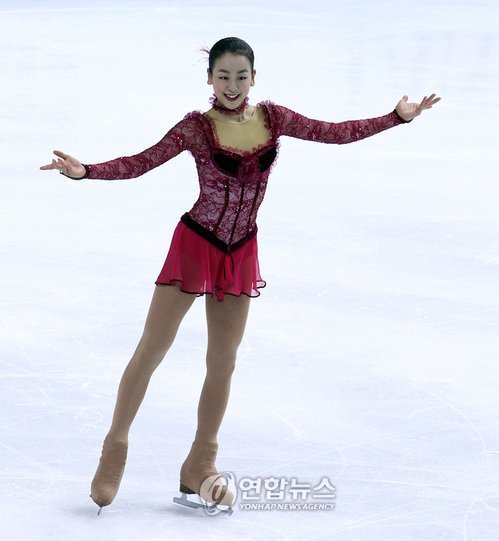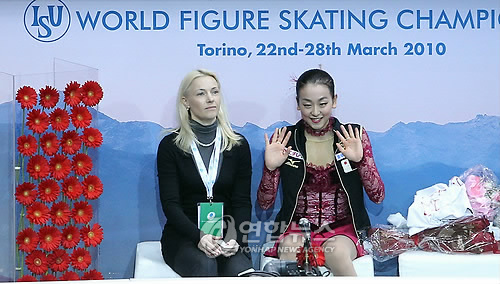I could have woken up early to watch the competition live, but since I was somewhat dreading the results, I decided to watch the free program a few hours after it was broadcast.
As with the short program, the Universal Sports broadcast started with the second-to-last group. Miki Ando went out and skated a clean program. She may have lacked some confidence and emotion in the beginning, but by the end, Miki really got into the music. Her coach, Nikolai Morozov, looked very pleased. But I agreed with what Tara Lipinski said—Miki has the potential to be on the podium at every competition, but she just looks a little scared. I wonder why?
Right after Miki, Yu-Na Kim took the ice. Since the beginning of the season, I had thought her long program was rather boring; I much preferred her 2008-09 “Scheherazade” program. But I freely admit that she skated it perfectly at the Olympics, out-of-place Bond girl poses and all. Here at Worlds, however, when Yu-Na was struggling, the program was simply a snooze for me. Yu-Na looked shaken up when she fell on her triple salchow (a problematic jump for her), she popped the final double axel, and she generally seemed flat throughout her program.
But of course, with Yu-Na being the Olympic champion and undeniable judges’ favorite, she received a whopping 130.49 for her mess of a program. It was a ridiculous score, but it did leave the door open for Mao and Mirai. Given their leads after the short program, they only had to score about 122 or 120 to beat her, and those scores were definitely within their capabilities.
***
In the final group, home favorite Carolina Kostner skated first. In the long program at the 2009 World Championships, I was there in the Staples Center when she had a meltdown on the ice, turning almost all her jumps into singles. This year, however, she put out a generally clean performance, and the crowd rewarded her with a huge applause. When her score of 115.11 came out, however, they booed.
As Mao took the ice, I worried, thinking, “I hope the unruly crowd doesn’t ruin Mao’s focus!”
2010 World Championships FS (British EuroSport commentary)
“Prelude in C sharp minor, Op. 3, No. 2” by Sergei Rachmaninoff
When the ominous opening phrase of “Bells” played, I felt my throat constrict. Unlike the day before, I had no idea what would happen. Visions of Mao’s terrifying slip before her opening triple axel in her 2008 long program flashed before my eyes. Here it comes! And landed!! Not as huge as at the Olympics, and with a slight off-balance moment on the landing, but otherwise clean.
Now it was time for the triple axel/double toe loop combo—beautiful! Clean so far! I started to relax as Mao nailed the triple flip/double loop combo and then the triple loop.
But then it was time for the jumps that Mao missed at the Olympics. I tensed up as she launched the triple flip/double loop/double loop combo—but it was perfect. And then the triple toe loop (gulp!)—landed with determination. Finally, the double axel from the outside spread eagle. She did it!! Perfectly clean!!!
Now she could go out and KILL the step sequence!! I got a little worried when I saw some debris on the ice, but Mao easily avoided it, and at the very end, when she thrust her hands into the air, she could not hold back a smile. Yes! I did it, she thought, swinging her arms in front of her.
THAT was the program I wanted to see. And THAT was the joy and relief I had wanted to see on Mao’s face.
But then it was time for the scores. Mao looked so nervous—later she even said she was afraid to look at the scores.
The judges HAVE to give her a better score than Yu-Na Kim, I thought. That was perfect! It would be a travesty to score that below Kim, I thought!
Mao’s score—129.50. I couldn’t believe it. Or rather, I could believe it; I mean, I had known all along that the scoring would be hugely biased toward Yu-Na. But I didn’t think that the judging would be so egregiously unfair.
What kind of system is this, that the girl who falls on a jump, pops another one, and is generally lackluster, outscores the girl who went clean (to the naked eye), did TWO triple axels, and got the whole crowd on its feet?
What kind of system is this, that Mao can look so satisfied after she finished skating, knowing in her heart that she had done everything perfectly—but still have to sit in the kiss ‘n’ cry and worry about how low the judges will score her?
It was simply disgusting. For me, it no longer mattered if Mao went on to win the competition. The score was a clear slap in the face, in my opinion. And you could see it in Mao’s reaction. There were no tears of joy as there had been at 2008 Worlds. She looked disappointed.
***
Near the end of the competition, I found myself in the distinctly uncomfortable competition of having to root against Mirai Nagasu, whom I do really like. She had a clear shot at the gold, but she made mistakes on both of her triple lutzes and then fell on a double axel.
The gold was officially Mao’s, for the second time. She had become the first Japanese person to ever win two World golds, and she had helped bring Japan its first men’s/ladies’ duo gold. But I still felt hugely dissatisfied.
How could I go on watching skating if the judging is like this?
***
The following day, I started to feel better. Seeing Mao smile always makes me smile.
(That’s Daisuke’s signature!)
A gold, is a gold, after all, and I certainly hadn’t been expecting it. And Mao had gotten her wish—to beat Yu-Na Kim properly, one last time.
2010 World Championships podium: Yu-Na Kim (Silver), Mao Asada (Gold), Laura Lepisto (Bronze)
***
21-year old pianist Nobuyuki Tsujii, who won the prestigious Van Cliburn piano competition in 2009 despite being blind from birth, once said that he admires Mao Asada because “even if her condition is not good in the beginning, she always makes a comeback and wins.”
That is exactly what Mao had done here. She could walk away knowing that she had skated perfectly (to the naked eye); she done everything she could, and she won that gold medal fair and square.
And that is why I will go on watching figure skating. Because deep down inside, I do believe that Mao Asada can win back the judge’s favor, even if Yu-Na Kim were to continue competing.
Because no one else has that ethereal quality and lightness on the ice like Mao Asada. No other skater is so like a ballerina. No one else embodies the music—yes, not expresses but BECOMES the music—like Mao.
If Mao plays to those strengths, or if Mao brought out her sparkling personality in her programs like she does in her exhibition programs, then I believe that the judges and the fans will fall in love with her all over again.
Tracy Wilson, one of Yu-Na’s advisors, was critical of Mao’s programs during the competition, but even she could not help but be completely charmed by Mao’s “Caprice.”
2010 World Championship Exhibition Gala
“Caprice” by Niccolo Paganini
So I believe that if Mao does choose audience-pleasing music and programs, she WILL regain the judge’s favor and get those high scores she deserves.
But even if she doesn’t—even if Mao decides to use difficult music because she likes it, even if she chooses absurdly difficult programs because she wants to challenge herself, and even if the judges continue to bash her—I will forever be a fan.
Because behind that brilliant smile and sweet countenance, I can see the adamantine soul of a TRUE athlete, a TRUE champion—one who aims not to win, but to test the utmost limits of her potential, and that of her sport.








